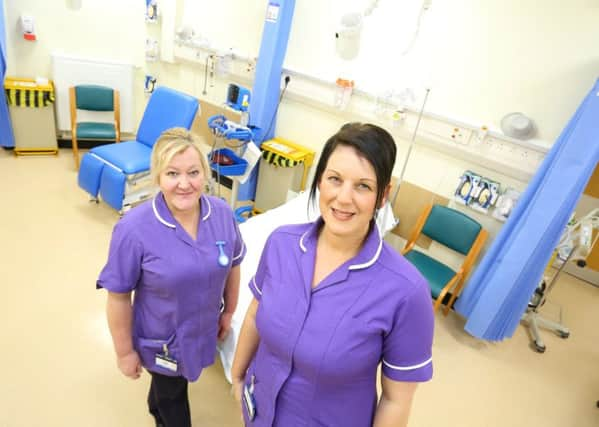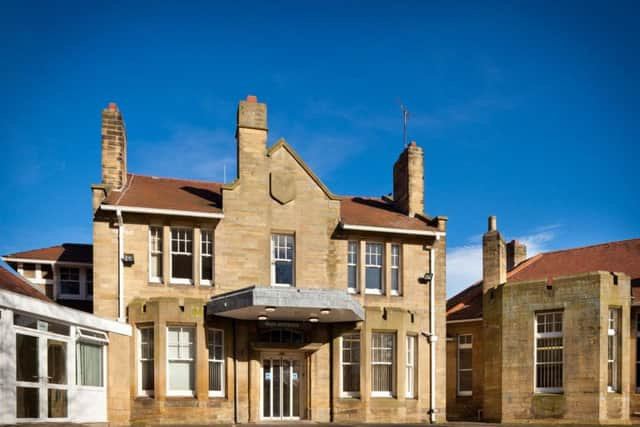Precautions in place to protect patients from flu


Winter is always a time when there is more pressure on the NHS, and this year has been no different.
Since I last spoke to you in November, before the winter really took hold, our teams in the hospital and in the community have been very busy caring for patients.
Advertisement
Hide AdAdvertisement
Hide Ad

At this time of the year, we tend to see more people who are very sick, for example those whose long-term condition has been exacerbated by the cold weather.
Over recent weeks we have also seen an increase in the number of patients with flu.
For well people, flu is unpleasant and can be incapacitating for a few days. However, it is not life-threatening. But for people who are over the age of 65, vulnerable and with a pre-existing medical condition, it can be fatal.
When treating people with flu in hospital and in the community, we have to follow very strict infection control procedures to prevent the virus from being passed on.
Advertisement
Hide AdAdvertisement
Hide AdIf you have been into one of our hospitals and seen staff and visitors wearing masks and gloves, this is the reason.
Reducing the spread of infections, such as flu and norovirus, is really important to us as a trust, and it is why we imposed partial visitor restrictions at our hospitals in mid-December.
At the time of writing, these restrictions remain in place.
This decision was taken after very careful consideration to ensure the safety of our patients and staff, and it was based on the hard lessons we learnt last year.
Advertisement
Hide AdAdvertisement
Hide AdYou may recall that last winter we needed to impose a total ban on visiting, given the high number of cases there were in the community and in our hospitals.
We want to avoid a repeat of that situation this year as no one wants to stop people from seeing their loved ones in hospital, and by introducing the partial restrictions it is hoped that this won’t be necessary. In fact, we can already see it having an impact.
The partial restrictions mean that visiting on our ward is restricted from 2pm to 3pm, and from 6.30pm to 7.30pm daily.
There are to be no more than two people visiting per patient at any time, and children under the age of 12 are not permitted to visit at all.
Advertisement
Hide AdAdvertisement
Hide AdSo far, it is working well and I would like to thank everyone for their understanding and co-operation.
It has been a change for us on the ward, given that we previously had ‘open visiting’, where friends and relatives were able to visit patients at any time, except at meal times.
However, it is a necessary move to try to protect our patients, the majority of whom are elderly and vulnerable.
These restrictions do not apply if you are visiting a patient who is receiving palliative/end of life care. However, I would still urge you to liaise with the nursing staff and contact the ward before you travel.
Advertisement
Hide AdAdvertisement
Hide AdAll visitors are urged to wash their hands thoroughly with soap and water before entering and on leaving the ward.
In any case, please do not come onto the ward if you have had symptoms of diarrhoea and/or vomiting in the last 48 hours, or if you have a cough or a cold until you are feeling better.
The amount of norovirus and flu we saw last year was unprecedented and while we are not at those levels this year, at present, we must take precautions as far as possible to prevent this from happening.
When there is a change to our hospital visitor restrictions, we will let people know and we will make sure our staff will share this message with patients and relatives.
Advertisement
Hide AdAdvertisement
Hide AdWe pride ourselves in providing integrated care, and by that, I mean ensuring our patients are able to go home from hospital as soon as they are able to, with the right support from community and social care teams in place to enable them to live well.
Our efforts to do precisely this have this year been bolstered by the roll-out of our Home Safe service at Alnwick Infirmary.
The service consists of teams of health and social care staff, including nurses, social workers, occupational therapists and physiotherapists, who work with partners and the voluntary sector to support patients who are returning home.
It’s a great addition to the hospital and will mean that our patients will experience a smooth transition from hospital to home.
Advertisement
Hide AdAdvertisement
Hide AdWhen services are busy during the winter months it’s really important that people choose the right NHS service for the severity of their condition.
I would like to remind people about the minor injuries service we have here at Alnwick Infirmary.
Our nurses are fully-trained to treat all types of minor injuries, such as those to ankles and wrists, for example, resulting from falls.
This includes the vast majority of broken bones as patients can have an x-ray here. Our x-ray department is open from 9am to 5pm on weekdays, and from 9am to 2pm at weekends. Outside of these times, patients will be given an appointment to come back the next day.
Advertisement
Hide AdAdvertisement
Hide AdOther injuries which can be treated at Alnwick include cuts and sprains.
If you’re not sure which is the best service to access, NHS 111 is available 24/7 for urgent medical advice.
Of course, if it is an emergency, ring 999.
I also want to issue a reminder that we introduced new parking charges at Alnwick Infirmary and right across our trust at the beginning of the month so if you’re coming in for an appointment or are visiting a loved one, please be aware of the new costs.
Just before I sign off, I would like to thank those people who have joined us as a member.
Advertisement
Hide AdAdvertisement
Hide AdAs I mentioned in my last column, we are looking to recruit more members to our trust from the Alnwick area and many people have already signed up.
Anyone can become a member and work to ensure that their area’s views are heard, and I would urge anyone with an interest in their local National Health Service to do so.
It is all part of being a foundation trust as we are accountable to the people we serve in Northumberland and North Tyneside, and we have greater freedom to plan local services and respond to the needs and wishes of our own communities.
To join us as a member, or for more information about this, visit our wesbite at www.northumbria.nhs.uk/members and complete the online application form. Alternatively, you can call our foundation membership team on 0191 203 1296.
Let’s hope the rest of the winter is kind to us all.
And as a final plea from me, please use the local health services wisely and make use of pharmacies and self-care where appropriate to help the NHS run as smoothly as possible.